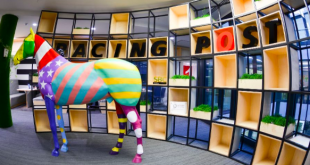BettorRetail frontman David McMorrow, former marketing guru at William Hill and Ladbrokes, discusses with SBC’s David Kelly how loyalty cards and gaming machines have energised retailers, although difficulties remain.
 How has Odds On!-Ladbrokes’ loyalty reward programme, changed the retail betting industry?
How has Odds On!-Ladbrokes’ loyalty reward programme, changed the retail betting industry?
Odds On! was the first betting loyalty card on the high street and was launched back in 2008. While other bookmakers have recently launched machine loyalty programmes, Odds On! is still the only loyalty card on offer for over the counter bets some six years on.
For Ladbrokes, it means they can try and grow their customer’s range of bets placed and manage their customer lifecycle – a real industry first in a hugely cash based anonymous environment.
However, the fact that other bookmakers still don’t offer a similar scheme may be an indication of how hard it can sometimes be to show an ROI [return on investment] on in-shop loyalty. The customers who have cards are your existing customers – what bets did they place before they signed up? Can you demonstrate that any uplift is because of the card – or just what they would have done anyway?
Men, by nature, can be hugely impulsive when it comes to betting. Will they always remember to hand over their card when the riders are already at the post for the big race of the day? Will they always hand over their card if they are having a quick ‘throw-away’ bet on the 49’s? If you can’t see everything that your customer does, then you only have part of the story – not least they could also be betting unmonitored at the competition.
But you have to imagine that success is in there as the scheme remains. Any new player to the over the counter loyalty market will be some years behind in calculating what appears to work and what doesn’t, and therefore, costs aside, Ladbrokes will hold the advantage.
How has betting shop technology changed in the last 5-10 years?
The biggest change has been gaming machines – which were introduced just after the millennium. They started small, but with the dawn of roulette, they now typically provide 50% of betting shop profits. But it’s not just the gaming machines that have changed the face of the betting shop. 10 years ago, TVs were small and expensive – now the opposite is true and ‘video walls’ are now becoming hugely common. Audio has improved too and is giving customers that cinema style experience on every race.
Content has increased dramatically. 15 years ago, you could still wait till the afternoon before horse racing began. Now virtual content dominates the airwaves, often looking more like the real thing than the real thing itself. Betting shops will often have more than one betting channel, meaning that you have a choice of virtual – or a choice of foreign racing in different parts of the shops. You’ll never wait more than a minute for the next opportunity to bet.
More machines are coming into betting shops too. While current legislation means the maximum number of gaming machines is four – you will often see self service betting terminals (SSBTs) dominate the walls – offering customers the chance to place their football or sports bets from across the world in multiple languages.
However, as much as technology has evolved, many things have remained the same. The Racing Post form is still displayed on the walls and cash is still king. You will still get a strange look if you pull out a debit card in a betting shop – probably the only place left in the high street where this is still the case. Of course, betting shops will take your debit card – but your fellow customers may be a bit perturbed that they have just missed the 4.10 while you key in your PIN.
What advances do you envisage in the near future?
 Screens will get bigger and the number of machines will increase. Costs will determine what new technologies can and can’t be brought in shop and at what speed. However it is difficult to see more content, given the thousands of races and tens of thousands of bets already offered. Betting shops will start to focus on getting customers to do more profitable or more engaging bets to boost their profits or the customer lifecycle.
Screens will get bigger and the number of machines will increase. Costs will determine what new technologies can and can’t be brought in shop and at what speed. However it is difficult to see more content, given the thousands of races and tens of thousands of bets already offered. Betting shops will start to focus on getting customers to do more profitable or more engaging bets to boost their profits or the customer lifecycle.
Bookmakers have tried to get rid of the newspapers on the wall and replace with electronic versions – but there is something comforting with the fact that you can peer over your fellow punters shoulder and read the paper form for Cheltenham with him, without the threat he is going to change an electronic display to the form at Plumpton.
A lot of business is taken by online services, but is not suited to everyone. How are retail betting shops coping with their online counterparts and competitors?
The two key benefits of in-shop betting are cash and community, and online will always struggle to replace these.
The fact that you can get paid out in cash a few seconds after a race is one of the reasons that betting shops continue in the main to thrive. Having that cash in your pocket means you can quickly get on the next race or head to pub to celebrate your winnings. While online is undoubtedly growing in popularity – the fact that bets can take some time to settle and withdrawals can still take days to hit your bank account – means that winning feeling is often gone by the time you get to spend your money.
Cash also gives control to customers. They won’t spend what’s not in their pocket. Cards and online can give some customers the temptation to spend what they don’t have or what they didn’t intend to. That’s why many customers still prefer the betting shop environment.
The community led environment of a betting shop also supports the long term sustainability of the betting shop. Being able to converse with fellow customers, cheer on the races together, brag about your successes, talk to the shop team and make friends are things that online offers, but doesn’t always execute in anywhere near the same way as you get in a live situation.
By focusing on these benefits, betting retail can continue to make sense in an electronic world.
FOBT’s have been in the news regarding problem gambling and addiction, as Ireland looks set to implement an outright ban. What do you believe can help address this particular issue?
The actual figures of problem gambling are quite low – but one problem gambler is still one too many and the industry needs to continue to work with government to take a responsible approach. New regulations continue to demonstrate that the industry is moving in the right direction and responding to customer concerns. But as human beings, we make our own choices, and betting organisations need to continue to innovate and provide fun and engaging betting opportunities in a safe and controlled environment.
Is there anything you’d like to mention that perhaps has been neglected by mainstream media?
Non industry media tends to focus on the negative – that we are building a nation of problem gamblers. But the opposite is in fact true. Sport and betting in this country is huge and is growing, and people want to be able to have fun, betting and turning their knowledge or opinion into a profit. It’s worth noting that the most common football customer in shop is a once a week visitor who is trying to turn £5 into £100 on an accumulator. Hardly a pastime that is going to put you on the street. That £5 also buys you some social currency with your mates in what you backed and how you triumphed – or how that one team let you down. All for the price of a pint.









